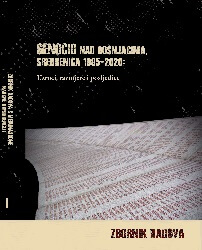Odluke i stavovi vijeća sigurnosti UN-a o genocidu u Srebrenici
Decisions and Positions of the UN Security Council on the Genocide in Srebrenica
Author(s): Alija Kožljak
Subject(s): Human Rights and Humanitarian Law, International relations/trade, Security and defense, Studies in violence and power, Victimology, Peace and Conflict Studies
Published by: Institut za istraživanje zločina protiv čovječnosti i međunarodnog prava Univerziteta u Sarajevu
Keywords: UN Security Council; genocide; Srebrenica; decisions; efficiency;
Summary/Abstract: The United Nations (UN), as the most representative representative of the international community, was established to ensure international peace and stability, prevent aggression or other violations of peace, and protect human rights and lives, while respecting the principle that every sovereign state is an equally important member. Therefore, the UN has both the right and the responsibility to take appropriate measures and actions against those who do not comply with international regulations in this regard, including sanctions. The genocide, committed in Srebrenica and neighboring municipalities in 1995, is the most heinous example of inhumane behavior and violations of international norms, which has unequivocally confirmed the ineffectiveness of the international community in preserving peace and preventing human suffering. However, in addition, the UN Security Council further confirmed its inconsistent action through the absence of full and adequate sanctioning of organizers and perpetrators of genocide. Of particular concern is the fact that the UN Security Council, as it did not take effective measures to prevent aggression against Bosnia and Herzegovina, and thus the Srebrenica genocide, did not take appropriate decisions and positions even after the genocide, until today. Despite UN International Court of Justice rulings on genocide in and around Srebrenica, the UN Security Council has never adopted a resolution, which formally confirms this. The aim of this text is to analyze the attitude of the UN Security Council on the genocide in Srebrenica. The research is focused on the decisions, attitudes and other activities of this body during and after the commission of genocide.These influences are determined through the analysis of UN Security Council documents, other international documents as well as national documents of member states. The consequences caused by such actions are also elaborated, which have a very wide range of implications, both for the countries concerned, as well as for society and the wider international community. The concluding remarks emphasize the importance of the decisions made and the views expressed, as well as those not adopted, suggesting alternative procedures, which would possibly represent some satisfaction, but to some extent also direct the future actions of the UN Security Council.
- Page Range: 283-312
- Page Count: 30
- Publication Year: 2021
- Language: Bosnian
- Content File-PDF

